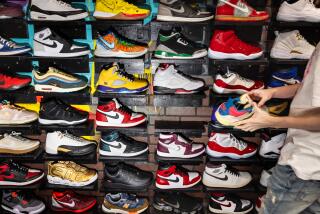Giving London’s homeless a leg up
- Share via
LONDON — Neil Featherstone, a former drug addict, strides through the doors of LogicaCMG, a technology consultant company, and is soon hard at work.
Shining shoes.
After being homeless on and off for 16 years, Featherstone sees nothing demeaning in cleaning the shoes of London bankers and businessmen to pay his rent.
“I don’t want sympathy,” he said. “I just want to be seen at eye level.”
Featherstone, 34, works for StreetShine, which helps London’s homeless by hiring them, teaching them how to shine shoes and then dispatching them to businesses that sign up for regular visits.
The shiner works at a single location for several hours a week, getting the chance to practice communications skills. People who might never talk get to know one another.
“On both sides, you’re breaking down preconceptions,” said Simon Fenton-Jones, chief executive of StreetShine. “Normally you don’t have that kind of interaction.”
StreetShine has struck agreements with some of the city’s largest firms -- Ernst & Young, Deutsche Bank and Reuters. Customers get desk-to-desk personalized service. The shiners get a base salary of $400 a week, plus tips and incentive payments.
But buffing boots is harder than it sounds.
There’s an element of salesmanship for energetic shiners such as Featherstone, who on one gloomy Tuesday strode through the west London offices of LogicaCMG, with his gear swinging from his shoulder. The computer geeks were wearing sneakers, so they weren’t interested. But as he moved to the desks of executives and salesmen, interest perked up.
Accountant Patrick Lalor stared at his scuffed shoes with the shame of a schoolboy called to the principal’s office.
“I don’t take very good care of them,” he said. “It shows.”
Featherstone assessed Lalor’s trashed oxfords with enthusiasm. Did Lalor know that a good cleaning could not only make a statement of elegance when entering a room but also extend the life of his shoes?
Lalor seemed dubious, but shrugged. He had little to lose.
Featherstone set to work, propping Lalor’s foot on a slanted plate attached to his kit. He stuck his thumb onto the once-black shoe below him, softly massaging a cleansing creme to rub out the grime.
A coat of polish and beeswax balsam creme, followed by a quick brush and buff with a ladies’ stocking, produced a lustrous shine last seen when the shoe was fresh out of the box. All for $8.50.
“Wow,” Lalor said. “That’s really impressive.”
“Never put your money against me,” Featherstone said.
Featherstone tells his story with so little emotion it sounds like it happened to someone else. He explains how he came to Britain from South Africa to look for his father -- only to find he wasn’t interested in being found. Alone and with nothing to fall back on, he quickly found himself on the streets.
He became addicted to crack cocaine. The turning point came when he had a perforated ulcer. A doctor told him that if he had arrived five minutes later, he would have died.
“It was only when I hit the ground really hard that I decided to change my life,” he said.
He quit drugs without help, going through three days of withdrawal and sweats. Then he moved to northern England, and got a job as live-in kitchen help.
He eventually moved to London and applied for work at StreetShine. “I haven’t looked back,” he said.
Homelessness in Britain isn’t as widespread as it is in America because of government programs here. Fewer people end up “sleeping rough” as they say here, said Jeremy Swain, the chief executive of Thames Reach, the homeless outreach organization that sponsored StreetShine’s creation.
In London on any given day, about 300 people sleep on the streets -- though many are believed to go uncounted. In New York last year, by contrast, officials estimated as many as 3,800 lived on streets and in parks and in subway stations.
Swain said some have criticized StreetShine, calling the work degrading. But it turning a profit and planning to expand its staff of shiners from 12 to 20 by year’s end.
Featherstone, for his part, also sees opportunity. He wants to expand -- maybe into Internet sock sales.
“The last thing a homeless person wants is charity,” he said.
More to Read
Inside the business of entertainment
The Wide Shot brings you news, analysis and insights on everything from streaming wars to production — and what it all means for the future.
You may occasionally receive promotional content from the Los Angeles Times.










